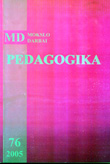Etnomuzikos poveikis paauglių tautinei orientacijai
The Role of Ethnic Music in Development of Shoolchildren's National Orientation
Author(s): Marija Baltrėnienė, Vida PalubinskienėSubject(s): Education
Published by: Vytauto Didžiojo Universitetas
Keywords: ethnic music; national orientation
Summary/Abstract: The article is an analysis of the role that ethnic music has in formation of national orientation. It also analyses schoolchildren's opinions on the necessity of ethnic music in learning and determines reasons for schoolchildren's unwillingness to learn ethnic music. The article is also a representation of the ways and forms, in which schoolchildren acquire knowledge in ethnic music. It includes a comparison of music teacher and primary form teacher attitudes towards ethnic music and the meaning it has in educational personality development. The authors also foresee efficiency of implementation of ethnic music via formal and informal education at school. The analysis of learner and teacher answers indicates that the research participants have primarily gained acquaintance with national songs and other forms of ethnic culture in their families, later at kindergartens and schools. Meanwhile, their primary sources of information have been teachers of music. The research performed includes surveying of 189 schoolchildren and 52 teachers of music from different regions of Lithuania. Having compared the research results with those of the earlier research, we came to a conclusion that a teacher of music still remains the basic and most active presenter of ethnic music. Mostly, he / she deploys Lithuanian ethnic music as an educational means. Ethnic music is basically not an important tool for teachers of music in development of schoolchildren's national orientation.
Journal: Pedagogika
- Issue Year: 2005
- Issue No: 76
- Page Range: 135-140
- Page Count: 6
- Language: Lithuanian

